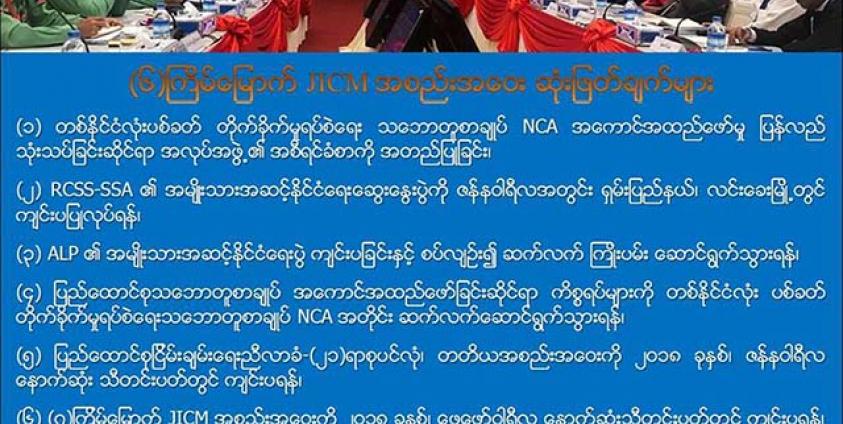A Shan State ethnic armed group will hold long-awaited political talks in January before another landmark peace conference is convened, officials announced following a meeting in Nay Pyi Taw this week.
After failing to gain government permission to stage national-level political talks at its headquarters, the Restoration Council of Shan State/Shan State Army –South (RCSS/SSA-S) has said the event will take place in Langkho instead.
The dialogues are intended to gauge public opinion regarding the peace process and the formation of a federal Union. The opinions are then collated for Union-level negotiations at peace conferences that ideally will produce a new constitution that redraws the lines of power and ethnic autonomy.
Only signatories to the government’s hallmark peace deal, the nationwide ceasefire agreement (NCA), are permitted to stage the dialogues, however, and even then, the RCSS has been blocked due to disagreements with the Tatmadaw over the best location. Shan organizations and Shan leaders have been trying since late 2016 to hold the political dialogue in either Taunggyi or Panglong.
But following a meeting a NCA signatories and the government in the capital on November 27, the RCSS settled on January 2018 in Langkho.
A Shan political party spokesperson welcomed the announcement, but added that the dialogue must not be conflated with taking the temperature of all the various Shan peoples, as it will likely only include a fraction of the ethnic groups living in the state.
“We have no reason to object to the RCSS/SSA acting on its right, but its talks cannot [be understood to] represent the entire Shan people even though it will hold a Shan national-level [political dialogue]. There are many disputable [issues]. There will still be many limitations,” said Sai Leik, spokesperson of the Shan Nationalities League for Democracy (SNLD), which is a member of the Committee for Shan State Unity (CSSU).
Following the Nay Pyi Taw meeting, the government also officially announced that the third Union Peace Conference – also called the 21st Century Panglong – will be held in the last week of January next year.
Many ethnic armed groups that are not yet party to the NCA are calling for the government to relax restrictions over who can and cannot stage national-level dialogues before the third Union peace meeting.
As Sai Leik pointed out, only a minority of the ethnic armed groups – just eight – have inked the NCA, and it is not fair to the other ethnicities if they are prevented from having a say in the formation of the future federal Union due solely to the ceasefire status of the area’s ethnic armed organization.
“The government itself said it’s a nationwide ceasefire but only eight out of twenty-one groups have signed [the NCA] so how can this represent the whole country?” he said.







